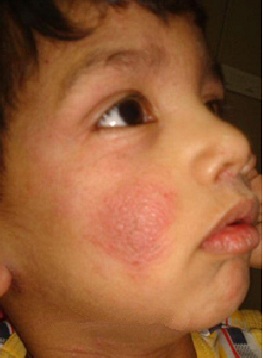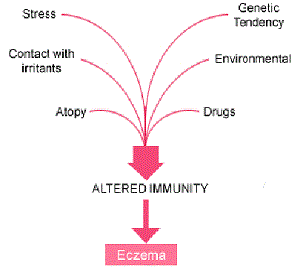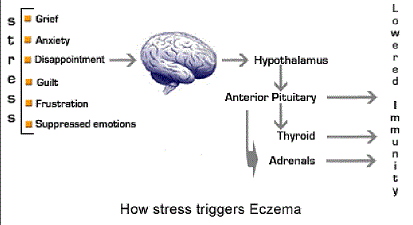- Our Location
- #604 1087 2nd Ave NW CALGARY ALBERTA,
POSTAL CODE T2N 5B2 Canada
- working hours
- Mon - Fri : 9:00 Am - 5:00 Pm
- Our Location
- #604 1087 2ND AVE NW CALGARY ALBERTA,
POSTAL CODE T2N 5B2 CANADA
- working hours
- Mon - Fri : 9:00 Am - 5:00 Pm
Eczema: Introduction
 Eczema is a generalized term that encompasses various inflammatory skin conditions. It is used synonymously with the term "Dermatitis" which means superficial inflammation of the skin (epidermis) that can be acute, chronic and recurring; can have a number of causes. Atopic dermatitis is another term used to define eczema.
Eczema is a generalized term that encompasses various inflammatory skin conditions. It is used synonymously with the term "Dermatitis" which means superficial inflammation of the skin (epidermis) that can be acute, chronic and recurring; can have a number of causes. Atopic dermatitis is another term used to define eczema.
Eczema is characterized by very distinctive reactive patterns of the skin, as discussed below.
Eczema is an inflammation of the skin which is characterized by dryness, flakiness, heat and, probably most importantly, itching. Eczema can occur on just about any part of the body; however, in infants, eczema typically occurs on the forehead, cheeks, forearms, legs, scalp, and neck. Affected areas usually appear very dry, thickened, or scaly. There may be some amount of hyperpigmentation of the affected parts. In children and adults, eczema typically occurs on the face, neck, and the insides of the elbows, knees, and ankles. In some people, the itchy rash can produce an oozing and crusting. In others, the condition may appear more scaly, dry, and red. Chronic scratching causes the skin to take on a leathery texture because the skin has thickened (lichenification).
There are two groups of eczemas called exogenous and endogenous. Exogenous eczema is mostly caused by contact with external factors such as irritant substances, certain allergens and due to photosensitivity.
Endogenous eczema is due to internal factors such as a generalized and prolonged hypersensitivity (atopy) to certain environmental factors. These factors could be chemicals, drugs, pollen, dust-mites, etc. These individuals also frequently exhibit one or more of other disorders such as asthma, hay fever, urticaria, food allergies, etc.
Eczema is a chronic skin disease reflected due to immunological changes within the body. Eczema is curable only if the immunological disturbance is corrected by internal medicines such as in homeopathy. Homeopathy offers effective and safe treatment for eczema.
Causes of Eczema
It is difficult to determine the exact cause of eczema as there are many different types of eczema and each has its own causes. Largely, the cause of atopic (endogenous) eczema is genetic (inherited). Atopy usually runs in the family and there is a family history of one or more disorders like asthma, hay fever, urticaria, food allergies, etc. A person who has atopic eczema is more likely to develop allergic reactions to many other things as well.. The causes of certain types of eczema remain to be explained, though links with environmental factors and stress are being explored.
Fundamentally, the caused of Eczema could be understood as:
1. Genetic components (Makes proneness to eczema)
2. Environmental factors (Triggers and maintains eczema)

There are many causes for exogenous eczema and following are the few common ones:
- Contact with irritants such as detergents, soaps, certain clothing or shoes, metal compounds (nickel, mercury, etc), dyes, cosmetic preparations (deodorants, nail paints, etc), topical creams, rubber, leather, resins, etc.
- Exposure to sunlight.
- Napkin rash in infants.

Eczema Symptoms in Kids & Adults

Atopic dermatitis presents with inflamed skin. The typical rash or eruptions are dry, scaly, red and with itching. The skin eruptions could affect any part of the body, however, it is more common on face, folds of hands and feet. The predominant symptom of Atopic dermatitis is intense itching. Thin watery discharge may ooze after itching. There may also be minor bleeding on scratching. Some of the lesions might get infected by contamination with bacteria, leading to pus formation.
Most of the patients which are treated conventionally with the use of cortisone in the form of topical cream or oral tablets; have a tendency to get suppressed. The patient and parents might get a sign of relief, least realizing that the effect of cortisone is only superficially and the disease will come back with vengeance.
It is a common phenomenon that patients tend to keep on using cortisone, masking the disease, and the disease goes deeper and deeper.
Symptoms in Infants:
In infants symmetric lesions are found over face (cheeks, forehead, scalp, and trunk), on the outer surface (extensor) of the extremities, scalp (sometimes causing alopecia). In extensive cases rash can be found even on the flexor surfaces of the extremities.
Symptoms in Children:
There is presence of symmetric lesions on the wrist, ankles and the flexor areas of the limbs. Generalized lesions spread all over the body can also be found in this age group.
Eczema Symptoms in Adults:
Predominantly affects the flexor areas of the arms, legs and neck. Other areas which can be affected are groin, axillary, etc.
Chronic Stage:
In chronic cases the skin is typically thickened and has pigmentary changes (hyperpigmentation or hypopigmentation). The papules are excoriated and there is presence of nodules on the skin. Intense itching is present in all stages of the disease hence the person tends to scratch all the time, this often leads to secondary infection of the lesion. As a result the lesion develops yellow crust over-laying pus and is surrounded by erythema.
ORDER TREATMENT ONLINE
Our Homeopathy treatment is now just a few clicks away.
(Treatment for additional diseases charged at 50%)

 Find
out the chances
Find
out the chances
of cure (Free)

